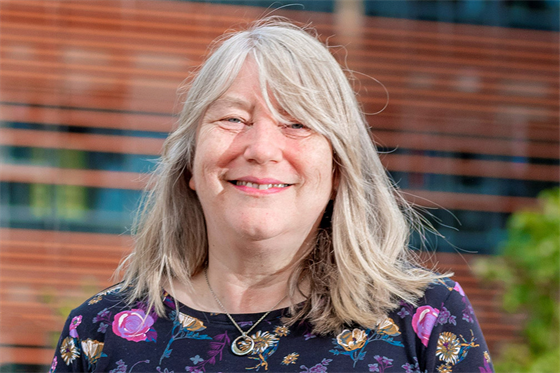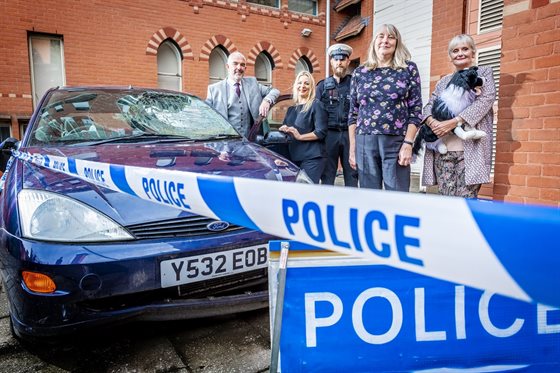Professor Angela O’Sullivan has dedicated her career to making higher education as inclusive as possible. Her passion has helped countless students from disadvantaged backgrounds fulfil their dreams of going to university. As she steps back from her illustrious career at De Montfort University (DMU), it was only fitting that her inspiring work is recognised through a national award.
Sat amongst friends and colleagues at Portcullis House, overlooking the Houses of Parliament, Professor O’Sullivan was presented with the Outstanding Contribution to Widening Access Award at the annual National Education Opportunities Network (NEON) awards.

Professor Angela O'Sullivan
“I was a little overwhelmed,” admits Angela, who had not expected the nomination to begin with. “It was the perfect way to step away from the job I held so dearly to my heart.”
Professor O’Sullivan has worked as DMU’s Head of Widening Participation within the Faculty of Health and Life Sciences since 2009, becoming a prominent member of the Leicestershire community by organising educational outreach programmes to help more people interact with STEM subjects.
The immersive crime scene investigation programme, CrashEd, saw Angela and her team awarded a prestigious Collaborative Award for Teaching Excellence (CATE) in 2018. The initiative is aimed at school students aged from 13 to 18, where they are presented with a staged car crash and must decipher how it happened by interviewing actors, working with Leicestershire police forensic collision investigators, analysing skid marks and assessing damage to the car and mannequin.
It has been praised for helping students, particularly from low-income and disadvantaged backgrounds, understand physics, use maths to work out the trajectory of the crash and give students interested in forensic sciences a better understanding of a real-life emergency.
Throughout the Covid-19 pandemic, she co-wrote interactive, online work packs for schools to use. The Strawberry Thief is an adventure that teaches children about Leicester’s history while tasking them to solve a crime using critical thinking skills; while In The Frame tasks students to identify a fraudulent artist by forensically analysing paint samples.
“CrashEd was probably my most popular programme. Working with Leicestershire Police and Leicester College, we used the crashed car as a physical learning tool to teach children maths, physics and forensics,” Professor O’Sullivan said.
“Students could analyse stopping distances to judge who was at fault, determine the speed of the car by the skid marks, identify if any illegal substances were used through forensic techniques, interview pretend eyewitnesses – all things that the emergency services would do in these situations – as well as asking the police more about their roles.
“We showcased it to a lot of children from communities that aren’t well represented in higher education, such as those from the traveller community, young carers and those from very low-income families. For some, it was the spark that would push a student to pursue a career in STEM and go on to study at university.
“Our Strawberry Thief online teaching pack has also been popular, and we’ve even had a school from Ireland reach out and explain that the task has become a hit in their school!”

Members of the CrashEd team: Mark Fowler, Marisol Martinez-Lees, PC Tim O'Donnell, Angela O'Sullivan and Annette Crisp
It’s her outreach work, on top of the day-to-day duties within the university, that has helped Professor O’Sullivan accumulate an enviable list of accolades including a Teacher Fellowship, an Advance HE National Teaching Fellowship, a Principal Fellowship of the Higher Education Academy and the illustrious CATE award.
In 2018, DMU was also named the University of the Year for Social Inclusion by The Sunday Times Good University Guide on the basis of its diverse population and the success of its students in exams and graduate job prospects.
But it’s the NEON award for widening participation that has resonated the most, with Angela describing it as the “culmination” of more than 25 years of working at DMU.
“Everything NEON stands for mirrors my own beliefs that education is for all. Receiving the Widening Access Award was truly a wonderful feeling and I couldn’t ask to represent a more inclusive university than DMU.
“It was such a lovely day and it gave me a chance to really reflect on my career, which was actually quite emotional for me. Ashleigh Hope and Brandee Percival, who I was nominated with, have done amazing work for their institutions so I never expected to win”
For Angela, the award win may have come as a complete surprise but for long-term colleague and friend Leisa Nichols-Drew, who nominated Angela for the award, her success is “a fitting testimony to all the work she has done for the community.”
Having worked with her on the development of the CrashEd, Strawberry Thief and In The Frame initiatives, Leisa, like many of Angela’s colleagues, felt inspired by the enthusiasm she showed for helping those in need.
Passion was Angela’s gift, Leisa explained, and part of a “wonderful legacy” of exciting ideas – including teaching children about chemical reactions by playing sequences on a xylophone – that helped more children engage in science and maths.
Leisa said: “She’s such an inspirational and innovative person who means so much to many of the staff here. Nominating Angela was a particularly proud moment for both myself and Dr Rachel Armitage, but we also did it on behalf of the young students she supported.
“DMU is very socially inclusive and supports a varied range of students in their studies. Angela is a large part of that. Through the outreach programmes, we have been able to help more students gain a greater understanding of subjects that they thought were beyond them, including the likes of medicine or forensics.
“It really is a privilege working alongside her, and seeing her receive the recognition she deserves was so fulfilling to me.”
That sentiment has echoed down to some of the students that Professor O’Sullivan has helped, too.
Geraldine Williams grew up in the care system and had a daughter before deciding to enrol at DMU as a mature student to study Biomedical Science. She excelled and was named Student of the Year by the Leicester Mercury before being encouraged by Professor O’Sullivan to study for a PhD at the University of Leicester.
Geraldine said: “I told her about my upbringing and being moved around from parent to parent to others and living in a volatile environment. She invited me along to an event she organised with forensics, where a group of young care leavers would come to the university and learn about crime scenes etc. This really opened my eyes; I had never known a lecturer that did this sort of thing before.
“I would never have thought that someone like me would ever be where I am today, and I can honestly say that Angela has played a huge part in my educational and career pathway. I will never forget the kindness and support she has and continues to show my daughter and me.”
Amir Mahmood was the first in his family to enrol at university when he arrived on campus in 2012, pursuing a career in medicine.
He said: “I was lucky enough to have Angela’s support as my lecturer as an undergraduate and her passion whilst I was working alongside her as a student ambassador. After graduating, I continued to work alongside Angela with the Square Mile project, coordinating projects for children across Leicester with an interest in maths and science.
“I have always been inspired by Angela’s dedication to helping children with the same roots and backgrounds as myself, showing them that despite the barriers and hurdles that they may encounter, they can still achieve their ambitions.”
While Professor O’Sullivan may now be retired, she isn’t taking a full step back from education. She will remain at DMU as a Professor Emerita, withdrawing from teaching duties but continuing some work on initiatives as well as maintaining her roles on national teaching and learning committees.
“I’m not a typical retiree, there won’t be any cruises. The university runs through my blood. I couldn’t just step away completely,” Angela said.
“I look around campus now and see so much diversity and a thirst for knowledge. It really is a great feeling to be part of this family.”
Posted on Friday 20 May 2022